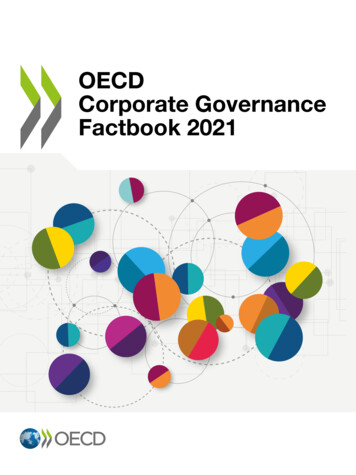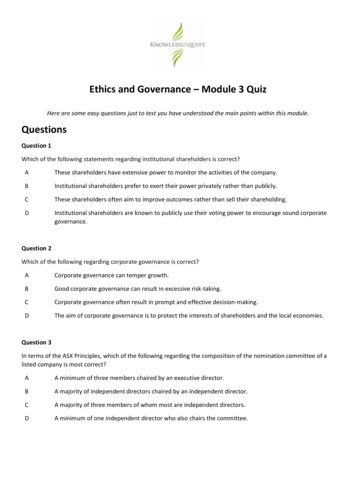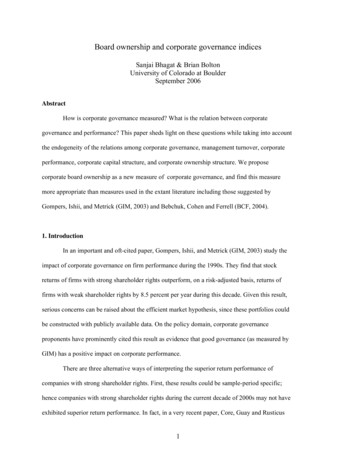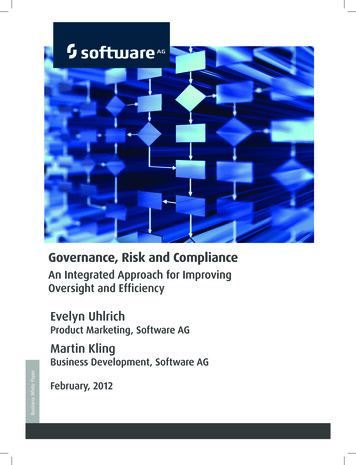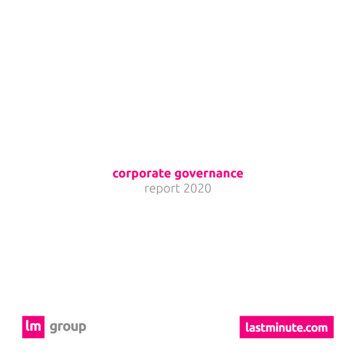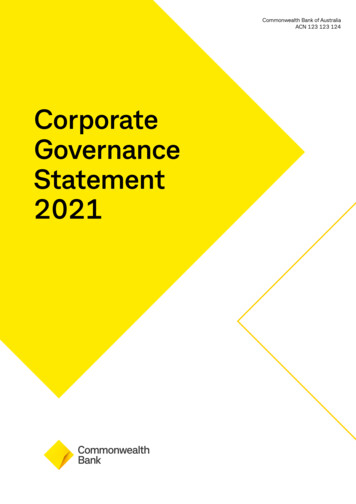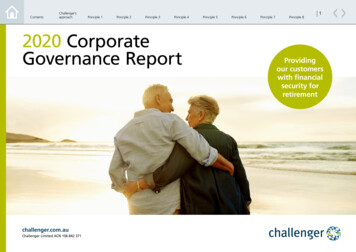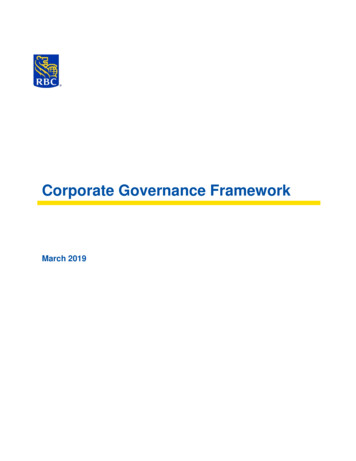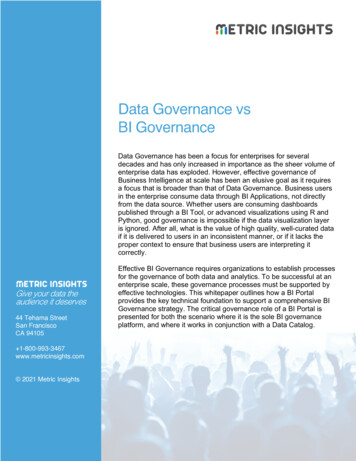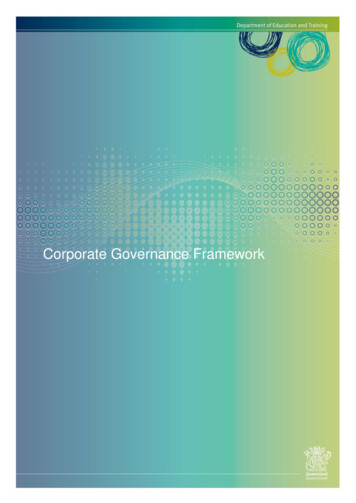
Transcription
Corporate Governance Framework
Director-General’s messageThe Department of Education and Training (DET) Corporate Governance Framework (theframework) sets out standards of accountability and transparency that stakeholders, thepeople of Queensland, and I expect of our department. It outlines the principles, elementsand mechanisms we use for effective governance.The framework outlines the need for continual performance improvement and better servicedelivery, balanced with the need to meet corporate obligations and legislative requirements.We must continually evolve governance arrangements to ensure that service deliveryobjectives are met effectively, efficiently and transparently. Accordingly, we review theframework at least annually to reflect changes to our strategic priorities, structural alignment,and current best practice.We have a duty to carry out activities according to required practice, and with the objectivesof Queensland students, parents, community, industry and stakeholders in mind.This framework will help us to assess the strengths and weaknesses of current practice, andto continually improve so that our stakeholders have ongoing confidence in our commitmentto deliver quality services to Queenslanders.Dr Jim WatterstonDirector-GeneralDepartment of Education and TrainingCorporate Governance Framework2
ContentsCorporate governance . 5Performance . 5Accountability. 5Principles . 6Values . 6Governance elements . 7Strategic plan . 8Annual report. 8State Budget . 8Legislation . 8Charter of Fiscal Responsibility . 9Integrity Act 2009 . 9Public Service Act 2008 and Directives. 9Public Sector Ethics Act 1994 . 9Industrial agreements, awards and guidelines . 9Information Privacy Act 2009 (Qld) . 9Public Interest Disclosure Act 2010 (Qld). 9Public Records Act 2002 . 10Right to Information Act 2009 (Qld) . 10Parliamentary Education, Tourism and Small Business Committee . 10Organisational structure . 10Policy and Procedure Register . 10Delegations and authorisations . 101Governance committees . 111Governance calendar . 11Long Term Financial Plan . 111Operational plans . 11Specific purpose plans . 11Corporate Procurement Plan . 111Governance and internal controls . 11Fraud and Corruption Control Framework. 12Enterprise Risk Management Framework . 12Business Continuity Management Framework . 12Performance Improvement and Accountability Framework. 12School Planning, Reviewing and Reporting Framework . 12Health, Safety and Wellbeing Management Framework . 12Capability and Leadership Framework . 13Developing Performance Framework . 13Corporate Governance Framework3
Open Data Strategy . 13Evaluation Strategy . 131Statement of Assurance . 131Internal audit . 13External reviews . 14Code of Conduct for the Queensland Public Service . 14Code of School Behaviour . 141Mandatory induction program . 14Performance agreements . 14Position role descriptions . 14Professional development . 15Managing employee complaints . 151Working for Queensland . 15Australian Early Development Census . 15Education statistics and information . 15Training statistics and data. 15Corporate Governance Framework4
Corporate governanceThe framework is based on best practice public sector governance, and identifies thepractices that drive and support good governance.The Australian National Audit Office defines Public sector governance as a set ofresponsibilities and practices, policies and procedures used by an agency’s executive toprovide strategic direction, ensure objectives are achieved, manage risks and use resourcesresponsibly and in a transparent way.Good governance has two main requirements:PerformanceHow we use governance arrangements to contribute to our overall performance and thedelivery of outcomes: to improve results by effective use of performance information for more equitable and cost-effective learning outcomes due to efficient use ofresources to increase the value of our business using a cycle of continuous improvement.AccountabilityHow we use governance arrangements to ensure that we meet the requirements of the law,regulations, published standards and community expectations: to fulfil obligations and legislative requirements in the best interests of our customers with clear procedures, roles and responsibilities to ensure confidence in our decisionsand actions to act impartially and ethically to meet community expectations of integrity,transparency and openness.The framework provides a balance between performance and accountability to ensure thatwe achieve better results, use resources in the best and most efficient ways, captureopportunities to add value to DET’s public assets, act with integrity and ethically in the bestinterests of our customers, and that decisions are supported by transparent and clear roles,responsibilities and procedures.Corporate Governance Framework5
PrinciplesThe framework is underpinned by the six foundation principles of public sector governancedefined by the Australian Public Service Commission: accountability — being answerable for decisions and having appropriatemechanisms in place to ensure the agency adheres to all applicable standards transparency and openness — having clear procedures, roles and responsibilitiesfor making decisions and exercising power integrity — acting impartially, ethically and in the interests of the agency stewardship — using every opportunity to enhance the value of the public assetsand institutions that have been entrusted to the agency’s care efficiency — ensuring the best use of resources to further the aims of theorganisation leadership — achieving an agency-wide commitment to good governance throughleadership.ValuesThe Queensland public sector has five organisational values to support the goal to be a highperforming, impartial and productive workforce that puts customers, the people ofQueensland first.These values are embedded into the framework to make sure that governance practices areconsistent with the behaviours that we value.CustomersfirstCorporate Governance FrameworkIdeas e6
Governance elementsSeven inter-related elements guide our practices:Direction — shared understanding of our purpose and priorities throughcollaboration and effective planning and resource allocationExpectations — agreedperformance expectations througheffective communication and bestpractice managementDelivery — quality customerfocused service delivery througheffective resource management,monitoring, review and reportingImprovement — enhanceorganisational performance throughreview, intervention, capabilitybuilding and internal controlmechanismsRisk management — regularlyassess and respond to risks and opportunities as a part of our daily activitiesResponsibilities — accountability and transparency for decisions throughlegislative compliance, information management, evaluation and corporatereportingAlignment — functions, structures and culture that support our organisationalgoals through quality leadership, a clear line of sight, role clarity andempowered staff.A quick guide accompanies this framework to improve accessibility and understanding.Corporate Governance Framework7
Governance practicesThe framework is implemented through strategies, policies, processes and resources thatprovide ongoing confidence in the integrity of our services.These practices have been mapped against the seven governance elements to ensure ourpractices are rigorous and robust.More detailed information about governance practices is accessed directly through thehyperlinks provided.Strategic planSets direction and communicates purpose, priorities, outcomes, values, and performancemeasures of success.Performance reviews are embedded into strategic planning processes and provideperformance information for improving service delivery and promoting system improvement.Annual reportDemonstrates performance to Parliament and the community. Contents are informed by theFinancial and Performance Management Standard 2009 and the annual report requirementsfor Queensland Government agencies.State BudgetIncludes information on resources allocated to support our direction and priorities, includingperformance targets for the coming financial year and performance achieved for the previousfinancial year.A Data Dictionary1 explains the data that is published in the State Budget.Internal budget processes ensure resources are managed within fiscal constraints. Resourceplanning allocation and reporting is consistent with Queensland Treasury’s FinancialAccountability Handbook.LegislationAdministered by, or relevant to, governance of the department which includes the Education(General Provisions) Act 2006, the Further Education and Training Act 2014, and theEducation and Care Services Act 2013.The Legislative Compliance procedure helps us to comply with legislation and standards.Corporate Governance Framework8
Charter of Fiscal ResponsibilityDetails the Government’s fiscal principles.The Financial Accountability Act 2009 provides accountability in the administration of theState’s finances. Our financial delegations under this legislation are contained in the Financeand Administration Delegation Matrix1.Ministerial Charter Letters list Ministers’ responsibilities and priorities that will be deliveredthrough our department.Integrity Act 2009Provides that the role of the Queensland Integrity Commissioner is to offer written advice toMinisters, Members of Parliament, senior public servants and others about ethics, integrityissues or conflicts of interest.Public Service Act 2008 and DirectivesIssued by the Queensland Public Service Commission to provide the statutory basis forhuman resource delegations.Public Sector Ethics Act 1994Prescribes how employees must behave in performing their duties.Industrial agreements, awards and guidelinesProvides terms and conditions of employment prescribed in legislation, industrial instruments(awards and agreements) and directives, negotiated and issued under Sections 53 and 54 ofthe Public Service Act 2008 and governed by the Industrial Relations Act 1999.Information Privacy Act 2009 (Qld)Protects individuals’ personal information. Our information privacy obligations outline how wecollect personal information, why it is collected and how it will be used.The Education (General Provisions) Act 2006, Further Education and Training Act 2014 andEducation and Care Services Act 2013 also provide confidentiality provisions.Public Interest Disclosure Act 2010 (Qld)Provides protection for staff members who speak out about wrongdoing.Our disclosure procedure outlines how to report a public interest disclosure.Corporate Governance Framework9
Public Records Act 2002Provides whole-of-government information policies and standards for public records.We use HP TRIM, an electronic document and records management system1, to managecorporate records.Right to Information Act 2009 (Qld)Provides greater community access to information in the Government’s possession, or underthe Government’s control unless on balance it is contrary to the public interest to disclosethat information. Our department assists the public to access or amend existing information.The Administrative Access Scheme provides processes for timely responses to requests forrelease of departmental information and records held in schools which might be outside ofthe Right to Information Act 2009 and Information Privacy Act 2009 legislative processes.Parliamentary Education, Tourism and Small Business CommitteeInvestigates and reports to the Parliament on issues such as the Estimates Hearings whichoccur each year following the presentation of the Queensland State Budget.Service Delivery Statements are a primary source of budget and performance information forthese hearings.Organisational structureAligns the department’s functions and operations with service delivery. It provides clear linesof reporting and accountability to support appropriate, open and transparent decision-makingprocesses.Policy and Procedure RegisterIs a central directory which provides staff and the community with access to departmentalpolicies and procedures.The register includes Commonwealth and Queensland legislation, policy, industrialagreements and directives, standards, procedures, authorities and delegations, guidelines,and forms.Delegations and authorisationsAssigns powers, functions, authority and duties to specific individuals or positions for eachpiece of legislation that the department administers.The Developing and Managing Legislative Delegations and Authorisations procedure helpsstaff to maintain the legislative powers and functions conferred on the Ministers and theDirector-General.Corporate Governance Framework10
Governance committees1Advise and support the Director-General in discharging responsibilities.Working groups, sub-committees, boards and forums1 support governance committees.Governance calendar1Shows the timing of governance processes to help staff and stakeholders plan for strategic,governance and performance-related activities.Long Term Financial PlanProvides a framework to deliver cost effective services, maximise value and plan for futureresource allocation, investment and financial sustainability.Operational plans1Are developed and reviewed annually to identify accountabilities, relevant initiatives andperformance measures that support the strategic plan in each unique operating environment.Performance reviews are embedded into operational planning processes and provideperformance information for improving service delivery and promoting system improvement.Specific purpose plans1Provide consolidated plans to address particular issues of customer groups. The AgencyPlanning Requirements lists mandatory and discretionary planning requirements forQueensland Government agencies.Corporate Procurement PlanProvides for high quality procurement activities to support and strengthen core servicedelivery in accordance with the Queensland Procurement Policy and the Purchasing andProcurement procedure.Governance and internal controls1Ensures financial transactions are appropriately authorised, processed and recorded andthat we are achieving our objectives.Corporate Governance Framework11
Fraud and Corruption Control FrameworkExplains how we protect public monies, property, information and rights to maintain theeffectiveness of departmental operations. We have a robust internal control process toprevent and control fraud and corruption.The Financial Management Practice Manual1 and Financial Accountability Handbook help usto meet financial, operational and regulatory obligations and comply with Agency PlanningRequirements.Enterprise Risk Management FrameworkContains principles for risk management adopted from Aust/NZ and International Standardfor Risk Management (AS/NZS ISO 31000:2009) to underpin our risk management processwhich describes how we identify, monitor, report and control risk.Business Continuity Management FrameworkExplains how we recover and maintain critical services following a disruptive event. Adoptedfrom Aust/NZ Standard for Business Continuity (AS/NZS 5050:2010), the business continuitymanagement process describes how we prepare, respond to and recover from a disruption.Performance Improvement and Accountability FrameworkHelps us to achieve better results through clear accountabilities and performanceexpectations. It describes a cycle of continuous improvement with effective use ofperformance information.School Planning, Reviewing and Reporting FrameworkSupports state schools to develop an annual school plan that is reviewed every four years tomaintain operational currency and focus.The Annual Reporting Policy for all Queensland Schools outlines the requirements for allschools to meet the reporting obligations required by both Queensland and AustralianGovernments by publishing information every 12 months.Health, Safety and Wellbeing Management FrameworkIntegrates health, safety and wellbeing into daily operations and culture. The Health, Safetyand Wellbeing Strategic Plan and Workplace Health, Safety and Wellbeing procedurescreate healthier workplaces under the workplace health and safety legislation.Corporate Governance Framework12
Capability and Leadership FrameworkDemonstrates the capabilities required of Queensland public service employees at all levels.The Workforce Capability Success Profile supports these capabilities.The Principals’ Capability and Leadership Framework focuses on building capacity and theDeputy Principal and Heads of Program Capability and Leadership Framework supportsinstructional leadership, capability development and performance development planning.Developing Performance FrameworkClarifies expectations, including tasks to contribute to key work priorities, career goals andcapability development activities.The framework is based on the Queensland Government Performance ManagementFramework, the Valuing Performance Policy, the Code of Conduct for the Queensland PublicService, the Culture and Values Action Plan1, the State Schools Strategy1 and the AustralianProfessional Standards for Teachers.Open Data StrategyProvides all Queenslanders with free access to data that we collect, generate and store1.This data can be used to stimulate innovation, support research and increase efficiency andperformance.Some information is not suitable for release because of privacy or confidentiality issues.Evaluation StrategyDescribes how program evaluations1 provide direction, oversight and quality assurance toanalytic and evaluation work and how information is used to inform decisions about futureactions.Statement of Assurance1Is a statement from the Chief Finance Officer to the Director-General about whether thedepartment’s financial controls are operating efficiently, effectively and economically.Internal audit1Enriches service delivery by identifying improvements in risk management, control andgovernance processes. Internal Audit provides audit and advisory services across all areasof the department.Corporate Governance Framework13
External reviewsProvide objective scrutiny. For example, Queensland Audit Office conducts financial andcompliance, information and performance management audits.Parliamentary committees monitor and review public sector organisations against theappropriate legislation.The Queensland Government periodically commissions additional independent reviews.Code of Conduct for the Queensland Public ServiceDescribes ethical principles, values and standards of conduct for how staff will perform theirwork and conduct their relationships with others.The Standard of Practice applies to everyone who works with the department in anycapacity.Code of School BehaviourDescribes standards expected in the school community, including responses andconsequences for inappropriate behaviour.The Responsible Behaviour Plan for Students is an agreement of students’, parents’ andstaff’s rights and obligations, and requires all parties to abide by the Code of SchoolBehaviour and other endorsed conditions stipulated by the school.Mandatory induction program1Must be completed by all staff within the first month of employment commencement andannually thereafter.Performance agreementsAre annual agreements for executives identifying objectives and indicators of success basedon Senior Executive Service Performance and Development Frameworks and the ChiefExecutive Service.Position role descriptionsSpecify the purpose, accountabilities, responsibilities and skills required for each position.Role descriptions may also include pre-requisite qualifications, registration or experience.Corporate Governance Framework14
Professional developmentIncludes professional standards which outline abilities, knowledge, understanding andprofessional values that staff within particular professions are expected to demonstrate;frameworks and standards that guide teachers’, principals’ and public servants’ professionalgrowth and development; and the Study and Research Assistance Scheme and relevantscholarships and awards which focus on organisational improvement.Managing employee complaintsIs a review process for employees who are dissatisfied with departmental decisions. Thereview can be administered through external bodies and tribunals including the QueenslandOmbudsman, the Information Commissioner, Queensland Parliament Committees, thePublic Service Commission, the Industrial Relations Commission, the Anti-DiscriminationCommission, the Queensland Civil and Administrative Tribunal, and local Members ofParliament to further ensure quality, consistency, transparency and accountability ingovernment decision-making processes.Working for Queensland1Is an annual survey of all Queensland public sector employees that helps us to betterunderstand the views of the sector's workforce and build engaging work places that supportemployees to be productive and effective.Australian Early Development CensusGives a snapshot of how children are developing by the time they reach school. The datahelps us to understand and reflect on developmental vulnerability within communities, assistin planning for children's optimal orientation and transition to school and to engage andcollaborate with Early Childhood Education and Care partners.Education statistics and informationContains statistical and demographic information about Queensland state schools andstudents.Training statistics and dataContains statistics, research and data including Queensland apprenticeship and traineeshipstatistics and Queensland Government training datasets.1 - Link available to Department of Education and Training employees only.Corporate Governance Framework15
The State of Queensland (Department of Education and Training).LicenceThis Corporate Governance Framework is licensed by the State of Queensland (Department ofEducation and Training) under a Creative Commons Attribution (CC BY) 3.0 Australia licence.CC BY Licence Summary StatementIn essence, you are free to copy, communicate and adapt this annual report, as long as you attributethe work to the State of Queensland (Department of Education and Training).To view a copy of this licence, visit .AttributionContent from this framework should be attributed as: The State of Queensland (Department ofEducation and Training) Corporate Governance Framework.Department of Education and TrainingEducation House30 Mary StreetBrisbane QLD 4000General enquiries:PO Box 15033City EastBrisbane QLD 4002www.det.qld.gov.au
Corporate governance The framework is based on best practice public sector governance, and identifies the practices that drive and support good governance. The . Australian National Audit Office. defines Public sector governance as a set of responsibilities and practices, policies and procedures used by an agency's executive to
